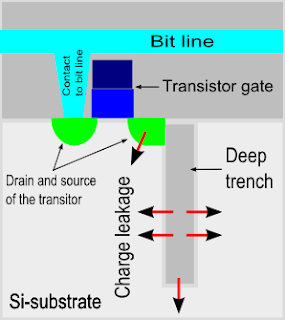RAMs:
- SRAM (Static RAM)
- Each cell stores 1 bit
- Each cell consists of a flip flop (6 transistors) > Large size - Low storage - High cost - More Power
- Faster than DRam
 |
| From Video: Embedded System Video 4 Memory Part 1 |
- DRAM (Dynamic RAM)
- Each cell stores 1 bit
- Each cell consists of 1 transistor + 1 capacitor > Small area - High storage - Low cost - Less Power
- The smaller area than SRAM because u need 6 transistors for one cell in SRAM, while u need only one in a DRAM. The capacitor needed in DRAM cell is done built in into the transistor
- Slower than SRam
- Mechanism
- Write '1': capacitor charge from Input buffer
- Write '0': capacitor discharge through Input buffer
- Read : capacitor discharges through Output buffer
- Then capacitor is recharged (refreshes through Refresh buffer)
- Examples:
- SDRAM (Synchronous DRAM)
- DDR SDRAM (Double Data Rate SDRAM)
 |
| From Qoura.Com |
 |
| From Video: Embedded System Video 4 Memory Part 1 |
Cache Memory:
- Is used to save portions of the data and instructions, that are currently used by the processor
- Requirements:
- Storage capacity can be small.
- Fast
- Used RAM:
- SRAM (Faster - Less Storage capacity)
Main Memory:
- The Big Ram that shall contain all the system data
- Requirements:
- Big storage capacity
- Speed can be less than cache
- Used RAM:
- DRAM (Not as fast as SRAM - high storage capacity)
ROMs:
- Mask ROM
- Programmed in factory
- PROM
- Contains fuses, can be programmed only once
- EPROM (Erasable Programmable ROM)
- Ex: Ultra Violet EPROM, can be erased using ultraviolet light, then reprogrammed
- Slow
- EEPROM (Electrically Erasable Programmable ROM)
- Flash memory: CMOS transistor with floating gate
- Hard disk
- Magnetic storage.
- Very Slow, Large capacitance, used for long term data storage
- Solid State Desk
- Like hard disk, but faster

No comments:
Post a Comment